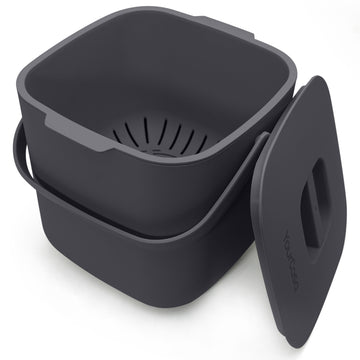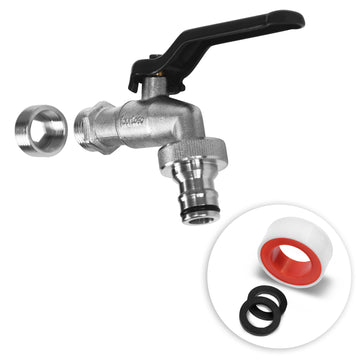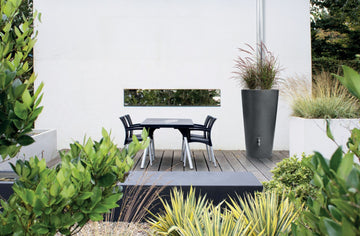Winter care for rain barrels and composters: Stay active in the cold season
by Robert Zielinski on Apr 09, 2024

Winter is generally a challenge for garden lovers. Freezing temperatures, it gets dark and rainy - and so cold that it snows or frosts. At this time of year, it is especially important to prepare and care for your own garden properly.
How do I care for my rain barrel and composter in winter? To care for my rain barrel and composter in winter, empty the rain barrel before the first frost to avoid cracks and insulate it if necessary. Cover the composter to protect it from too much moisture and stir the material regularly to encourage decomposition even at lower temperatures. Make sure to maintain a balance between green and brown materials to ensure effective composting.
In this article, you will learn how to prepare your rain barrel and composter so that they survive the frost unscathed and you can start the next spring without any problems.
Protect and maintain rain barrels in winter
Rain barrels require a lot of attention in winter - they can quickly be damaged by frost and become unusable for the next year . This is because freezing water spreads and can damage the material your barrel is made of. Careful preparation and maintenance will prevent such damage. We'll show you how.
Frost protection measures
To avoid this, you should empty your rain barrel in good time and clean it thoroughly so that no water or other residues remain. This will prevent cracks and damage caused by freezing water. To ensure that no new water collects in the barrel after cleaning and that you don't have to repeat the whole process, you should turn the barrel over afterwards or at least cover it. Insulation can provide additional protection and preserve the structure of the barrel at low temperatures. Emptying the barrel also prevents the formation of algae.
And by the way: Some of the YourCasa rain collectors can be easily converted to winter operation using a shut-off valve.
Maintenance tips for the cold season
In addition to frost protection , regular maintenance of the rain barrel in winter is important. Clear it of leaves and dirt to avoid blockages and check all connections and the outlet tap for leaks. This will ensure that your rain barrel is ready to work efficiently again with the first rains in spring.
Continue composting in winter
Many people don't know it, but you can compost in winter too - despite low temperatures. With the right measures, you can ensure that the biological process continues in your waste. We'll be happy to tell you what these are.
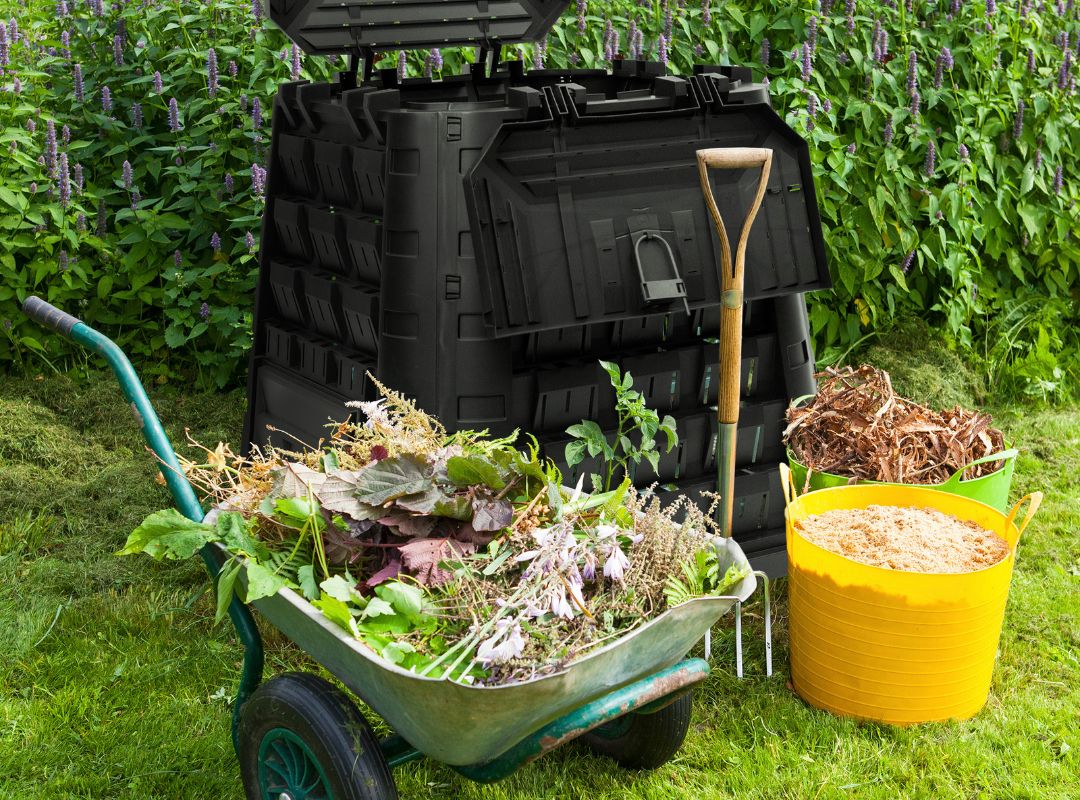
Adjustments to the composting process
The freezing cold of winter can slow or stop the composting process . That's why it's important to protect the compost pile from extreme weather conditions and ensure adequate ventilation. By covering the compost pile with an insulating layer, such as straw or a tarp, you can keep the heat inside, which will allow the decomposition process to continue even in cold weather. Regularly turning the compost encourages ventilation and prevents the compost material from freezing through.
Winter compost materials
Even in winter, compostable materials are produced in the home and garden. Here are some examples:
- Leaves : Rich in carbon, provides a good balance to nitrogen-rich kitchen waste.
- Kitchen waste : Vegetable scraps, coffee grounds and eggshells remain valuable sources of nitrogen.
- Garden waste : Pruning residues and dead plants can be added as long as they are not carrying any diseases.
- Newspaper : Added in moderation, it can help regulate humidity and improve ventilation.
Instructions for winter-proof garden irrigation
The same applies to your entire irrigation system as to your rain barrel: Before winter sets in, you should make sure that there are no water residues left in it. This will prevent damage. Water residues can freeze and damage the material. Therefore, remove all hoses from the taps, empty irrigation pipes and store all moving parts and your rain barrel in a frost-proof place - this way they will survive the winter unscathed.
Winterproof garden furniture and decoration
Your garden furniture and decorations are usually not that sensitive. Therefore , it is usually sufficient to cover them . Alternatively, you can of course store them in a warmer indoor space, for example in a garden shed.
Protecting plants and beds in winter
Things are a little more complicated when it comes to plants and beds. Mulching helps to insulate the soil and keep the roots warm. For particularly sensitive plants, cold protection products such as fleece or special plant houses can be used.
Benefits of winter care
Careful preparation before winter and care during the cold months offer numerous advantages. What are they? You can read about them here.
- Protection against damage : Winter care prevents frost damage to rain barrels.
- Immediate spring readiness : Preventive maintenance ensures that rain barrels and composters are ready for use right at the start of the new season.
- Maintaining functionality : Regular care extends the life of garden utensils.
- Optimization of the composting process : Even in winter, a nutrient-rich soil additive can be produced through adapted composting.
- Sustainable gardening practice : Winter care supports year-round, environmentally friendly gardening and promotes biodiversity.
- Preparing for Spring : Well-maintained equipment makes spring gardening easier and contributes to healthy plant growth.
Tips for a spring-ready garden
In spring, life blossoms again. It gets warmer, the sun shines more often, and it often rains a lot. The plants in your garden like that. To get the most out of this season, you should follow a few tips .
Start preparing for spring in winter . Clean your garden equipment such as compost bins and bins completely, check everything in the garden for damage and plan exactly what you want to do in the warmer months. That way you won't be surprised by the first sunny days and you can start gardening straight away.
It is also important that you enrich your soil with compost , which you ideally produced in your composter over the winter. This will lay the foundation for healthy and rapid growth of your plants in the spring.
Products suitable for winter from the shop
At YourCasa you will find everything your garden needs for the cold season. From frost-resistant rain barrels to efficient composters for year-round use - discover our helpers to optimally manage your garden even in the cold season.
Rain barrels for cold months
Our range of rain barrels is specially designed for winter use , with particular attention to frost protection and easy maintenance.
| Product name | Characteristics | Price (€) |
| Wave Design | Frost-resistant, stylish wave design | 139,00 |
| Amphora Design | Antique design, robust against cold | 95.99 |
| Premium 290L | Large volume, frost-resistant | 179.99 |
| Seabreeze Flower | Decorative and winterproof | 109.99 |
| Stonerain | Stone look, resistant to frost | 349.99 |
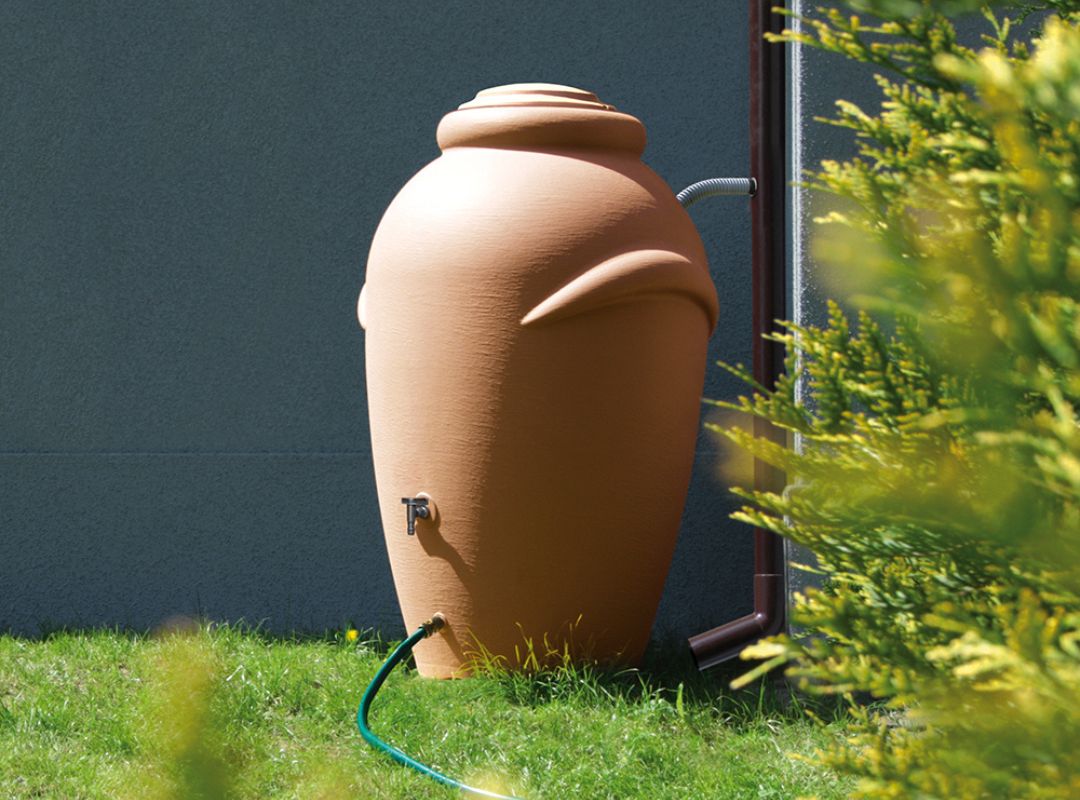
Composter for winter composting
Organic material can be composted effectively even in winter. Our composters are designed to maintain the composting process even at low temperatures - in the garden or directly in the kitchen.
| Product name | Product type | Characteristics | Price (€) |
| Ecofusion | Garden composter | 450 liters, robust against weather influences | 84.99 |
| Compost bin 7L | Kitchen composter | Large volume for kitchen waste, including activated carbon filter | 52.00 |
| Compost bin 4L | Kitchen composter | Compact for smaller kitchens, with odor control | 29,99 |
| Compost bin 6L sustainable | Kitchen composter | Sustainable materials, effective odor reduction | 39,99 |
| Organic waste bin 6L | Kitchen composter | Practical for everyday use, including lid to prevent odors | 19,99 |

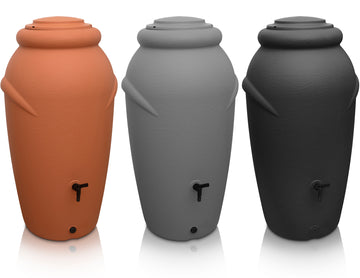
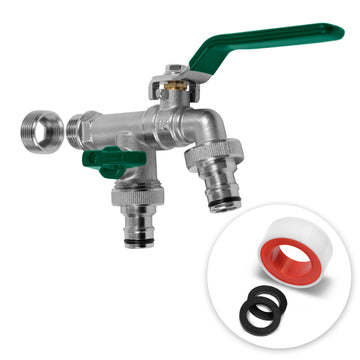
![Drei hohe YourCasa Regentonne 240 Liter [Wellen-Design] - Frostsicher & UV-beständige Gartentöpfe in den Farben Schwarz, Grau und Terrakotta, jeweils mit Drainagesystem für nachhaltige Bewässerung.](http://yourcasa.de/cdn/shop/files/ohnelogo_b8aeecac-557e-4106-a999-e77dcd160209.jpg?v=1707130230&width=360)
